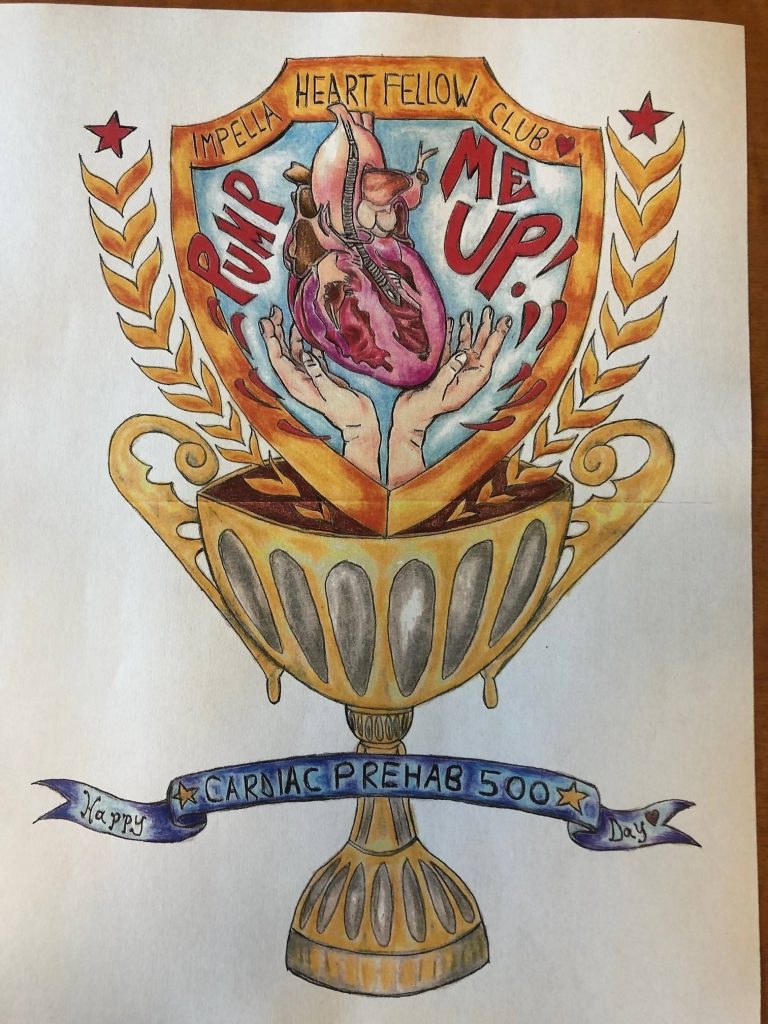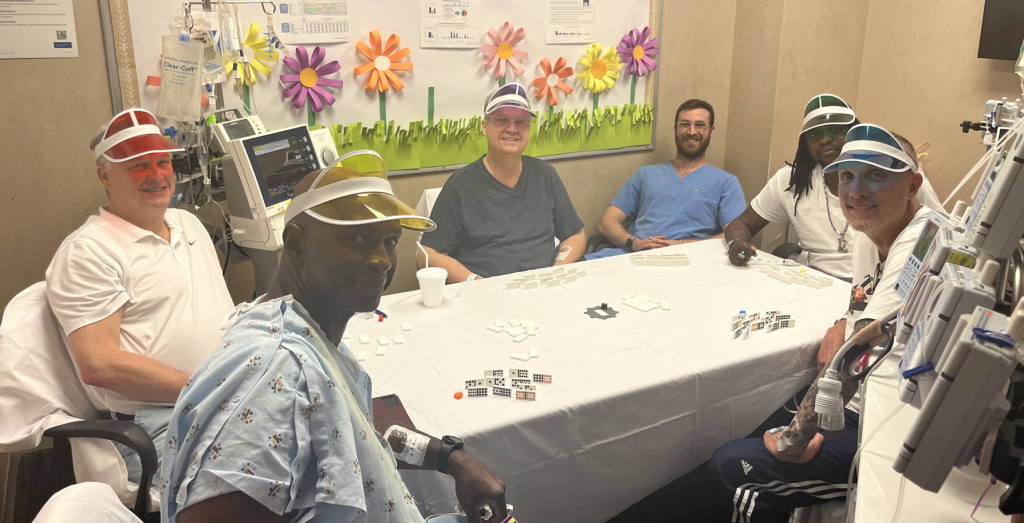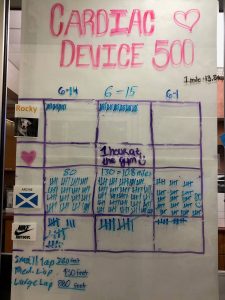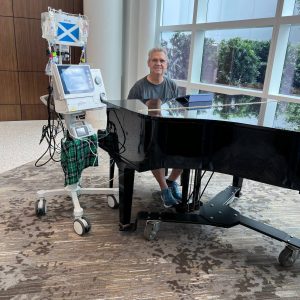
The fall
It was Good Friday 2023. Mark Forbess was just leaving Mayo Clinic in Florida after his first appointment as a new patient at the heart failure program, when everything went black.
"I found myself on the pavement in front of Mayo Clinic," says Mark. "I was emerging from unconsciousness. Everything was dark. I opened my eyes to see that my face was pressed onto the hot, black pavement."
People nearby ran to his aid as he experienced excruciating pain in his head, back and neck. From there, he was rushed to the emergency department in the building he was just leaving.
Mark had experienced a devastating heart electrical event.
Where it all began
At around 33 years old, Mark was diagnosed with hypertrophic cardiomyopathy (HCM), a disease in which the heart muscle becomes thickened. The thickened heart muscle makes it harder for the heart to pump blood.
"Over time, my heart health began to decline," says Mark. "The heart failure turned into devastating episodes of atrial fibrillation (AFib) and ventricular tachycardia (V-tach). During this time, I experienced four V-tach episodes which required my implantable cardioverter defibrillator (ICD) to bring me back to life, in addition to eight cardiac ablations."
In the fall of 2022, he was referred to Mayo Clinic for a PET scan to look for other heart diseases. At the time, nothing was found that met Mayo Clinic's heart failure treatment criteria, so he was not approved as a cardiology patient. However, in March of 2023, after experiencing congestive heart failure while being treated at another medical institution, he was referred to Mayo Clinic again as a candidate for the heart failure program.
The following month, he was approved for the program under the care of Dr. Melissa Lyle, a Mayo Clinic cardiologist.
A candidate for transplant
After the emergency department triage, Mark recalls his cardiologist saying, "Congratulations, Mr. Forbess. You just won a ticket to be evaluated for the heart transplant program." From there, he went through a battery of evaluation tests, which he passed, officially allowing him access to Mayo Clinic's heart transplant program.
"I knew that when Dr. Lyle told me I was entered into the Mayo Clinic heart transplant program that God was in total control of my life," says Mark. "He was guiding her and providing the confidence, from years of training, that I could live a happy life again by having a new heart."
Within a month, Mark was admitted to Mayo Clinic and waitlisted for his new heart. Transplant patients are ranked by necessity, and due to his condition, he was at the top of the list.
Mark had a rare heart deformation in which his left ventricle was very enlarged. This is considered unusual in HCM patients because their heart walls are usually very thick and the ventricles are small. As a result, Mark became eligible for a cardiac device — a small heart pump that helped improve his oxygen blood levels while he waited for his heart transplant.

The Daytona 500 meets the ICU
In an effort to lift the spirits of their patients and encourage some much-needed exercise, the nurses on Mark's floor came up with some competitive fun.
"These patients are not your typical ICU patients," says Sara Vilela, registered nurse. "They are often walking and talking, something we are not used to in the ICU. This means we have to make sure we are catering to this special patient population and ensuring that not only their medical needs are being taken care of, but also their social needs."

The nursing staff set up a series of games from dominoes to a "Cardiac Device 500" footrace between patients around the hospital unit, measured by the distance they walked each day.
"It was a bit of a leap to think playing games at a time like this was appropriate," says Mark. "After all, we were in the ICU. When you showed up and participated, you were hooked. It was that much fun and necessary. No medical tests, no medicine and no bad news. Nothing but fun, and that’s always good for the soul. I participated in afternoon game sessions with other heart transplant patients, their families, my brother Jeff and the outstanding Mayo nursing staff. We looked forward to the opportunity to meet each other and focus our minds on something we had in common and away from our current health status."
The games were a big hit among the patients, inspiring much creativity, especially the races. They created names for their cardiac devices, team logos and even fake sponsors. Mark named his heart pump "Archie," after his father.

Mark recalls being barely able to walk a small lap at the beginning of this journey. However, walking more and more each day, motivated by a new heart and some friendly competition, he began walking about five to seven miles a day, even hitting a heart pump record of 10.8 miles.
"By hosting game times, these patients were able to talk to one another about the struggles of waiting for a heart transplant, but also the triumphs, such as beating their previous day's record of laps," says Vilela. "They connected over this unique experience and bond with one another, which resulted in a patient population encouraging each other, remembering they are not alone on this journey."
Inspired by memories
Mark lost his wife of nearly 40 years, Michele, in June 2022, approximately 10 months before entering Mayo Clinic on the heart transplant waitlist.

"I had spent many days grieving in the Mayo atrium over my wife," he says. "I wanted to change that to positive, fun memories instead by providing a little entertainment playing the beautiful grand piano and maybe brighten someone else's day." He pursued the opportunity to play with the encouragement of one of his nurses, Frances Ausley, and Rose Grace from the Humanities in Medicine Department. Grace is a concert level pianist herself who occasionally visited Mark in his hospital room to play the keyboard.
"Frances Ausley has incredible capabilities and a very hard work ethic while providing care to all those around her," Mark says. "Rose Grace encouraged me and gave me the confidence that I could play the piano under these circumstances."
While playing the piano helped, he still found himself battling anxiety and sadness around the anniversary of losing his wife.
"Managing anxiety on the one-year anniversary of my wife's passing was going to be very difficult," Mark says. "Wanting to celebrate her life outside, I was stuck in the ICU waiting for a heart, knowing that any high anxiety could trigger severe heart arrhythmia. Carolina Robles de Brady, a wonderful and thoughtful nurse from El Salvador, secretly arranged to reenact the dinner my wife and I had made on our first date — chicken cordon bleu with blueberry fluff as dessert. She asked me the day before about memories of a favorite dinner with my wife. I was pleasantly surprised as Carolina kept me calm while we celebrated my wife's life."
Later on, Mark would nominate Carolina for a DAISY Award, honoring nurses who go above and beyond to provide compassionate care to patients and families. She was selected and recognized with the award in December 2023.
A new heart, a new day, a new future
On July 14, 2023, Dr. Rohan Goswami entered Mark's room. Expecting another donor update, the news was different this time. "I found you the perfect heart," Mark recalls Dr. Goswami saying.
"I never had children, but I’m guessing this is one of the most exciting pieces of medical news you could ever receive," says Mark. "After several months of waiting, Dr. Goswami is telling me I have a heart coming. It was an unbelievable experience. The sacrifice a donor family makes to give organs to another human being is one of the greatest acts of unselfishness and kindness a person can do on this earth. It's real, and it's effective. My donor family will be forever in my soul as I wake up every day thanking them in my prayers."

Mark received his new heart on July 17, 2023.
After more than 30 years as an investment banker, Mark started thinking about a long-term career goal he'd always wanted to pursue. Since childhood, he wanted to be a screenwriter and filmmaker.
"Before I entered the hospital for my transplant, I purchased screenwriters professional software used to write film scripts and loaded it onto my computer," says Mark. "I always wanted to produce films that would help people find true, long-term happiness in life. If I could write one particular story while waiting for my heart transplant, I would be a happy person myself."
Since leaving the hospital, he has achieved this goal by completing his first screenplay and has begun the process of marketing it to the film industry. As for his health journey, he continues to excel at cardiac rehabilitation, lowering medications every month as his recovery progresses.
Paying regular visits to Mayo Clinic staff since his transplant, Mark acknowledges that everyone he met while waiting for his transplant helped make his experience a good one.
"During this time, I would meet many incredible nurses, doctors, physician assistants, housekeeping team members, Food Services team members and a host of other personnel who took great pride in their roles," says Mark.
His interactions with all staff, even beyond his hospital room, became an expansion of his care team. Many share that Mark had just as much of an impact on them.
"The power of food and how it changes the patient experience by broadening the scope of meal service providing comfort, connection and nutrition is a component of their care," says Casey Wingerter, patient ambassador for Mayo Clinic Food Services. "During Mark's stay at Mayo, meals became a medium for connection, and connection was critical for his transplant journey. He healed while at Mayo, and it was the people that made the difference. That human connection is what he held on to and is why he became a bright spot in our staff's days as well."
Mark recalls how much Wingerter and her team truly made a difference. Before he left the hospital, he says the Food Services team gifted him a small suitcase full of his favorite gum as a way of saying thank you from Wingerter and the Food Services team.
"I firmly believe God answers our prayers," says Mark. "My hope is that my testimony can serve as a powerful tool for you to convey the profound significance of God in our lives. His presence can guide us through seemingly impossible challenges, which will lead to a truly long-term, happy life."
Additional resources:
- Mayo Clinic Minute: Know the warning signs of hypertrophic cardiomyopathy
- Sharing Mayo Clinic: A heart patient’s fall picks up something big
- Mayo Clinic Minute: What is hypertrophic cardiomyopathy?







